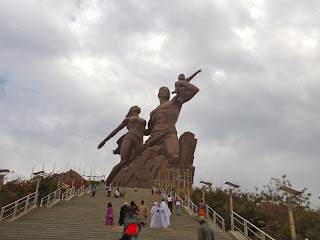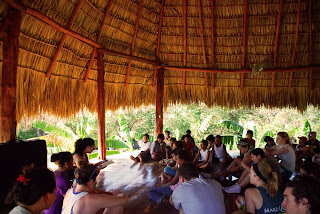I arrived at my home-stay family’s
house last Friday night after a whirlwind week of orientation. We spent this past week registering for classes,
learning some customs of Senegal, eating around the bowl, getting to know each
other, and stumbling through our survival Wolof classes. This past week I have come to realize the
inherent differences between Senegalese culture and American culture, in-fact,
at times, they are completely opposite.
I am going to highlight two of the contrasts here:
Greeting Each Other
In the United States, especially Washington
D.C., the concept of greeting other on the street is completely foreign. We wander around, well more like race around
our days with our heads to the pavement just trying to speed to the next
meeting or appointment. However, in
Senegal the concept of greeting one another is one of the most important
values. It comes from the idea of Nit, Nitay Garamba, which translates
into “every person is another person’s tree.”
The Senegalese believe that we were brought into life by the hands of
humans, and the hands of humans bury us; therefore, being around humans is the
most important aspect of life. Not
saying hello, either in French or Wolof, to every person you see is considered
rude and others assume you are mad or upset.
Similarly, once you greet someone, a conversation of substance will
often ensue. The other day a few of us
were walking on the beach and met a man who we then spoke to for the next 30
minutes. In Senegal everyone is friends
and therefore we must say Bonjour, ça va? or Salamaalekum, Nanga def? to all of
our friends.
Terranga=Hospitality
The Senegalese are some of the
most hospitable people in the world.
However, they might not be hospitable in an American sense. When you enter a home, if the mother is
making dinner she will stop everything and talk to her guest because they are
the most important thing. Senegalese are
never alone, and a Senegalese household is never empty. There are constantly neighbors, cousins, and
friends over for conversation, sharing meals, or simply to enjoy each other’s
company. In Senegal a person’s wealth is
measured by how much they give and how much they are given. This concept is known as Am-Am, and is by far
my favorite thing I have learnt in Senegal thus far. I love the idea of a world based on giving to
one another, where wealth is based on hospitality and kindness rather than
material aspects.
As I said before, I moved into my homestay last night. I am living in the Ouakam neighborhood, which is about an hour walk from my program center in Mermoz or a 20 minutes bus or car rapide ride. The car rapides are best described as a mini bus version of a roller coaster. The cars are mini yellow buses decorated to the tilt with colorful paintings, streamers, and most of them with the saying “Alhamdulilaay” (Praise be the God) painted on the front. I am excited to become a pro car rapide rider.
My family is smaller than most Senegalese families, at least currently, because my host brother Moustaphaa is studying in Paris, and my two sisters are married and live in other neighborhoods. However, they both have young children who I can’t wait to meet! I share the house with my mother, Mama Marie, my father Tidiane and my 26 year old sister Thiané, oh and we have a pet goat named Mouton! It is an adorable quaint house with a nice patio area in the back (where the goat lives). Last night about an hour after my arrival the power went out, but it was fun. My host sister, mom and I looked through family pictures by candlelight and talked. Luckily the power came back on right as we were preparing dinner! Random power outages, another thing to get used to in Africa. My homestay family has also turned me onto Tea, well Senegalese tea. There are two national teas of Senegal, Kimkelibam and Ataaya. Kimkelibam is delicious and is normally for after breakfast. My family used mint from our backyard for the tea! Ataaya is more common and normally taken around 7pm. It is served in three separate small servings, the first is bitter, the second more sweet and the third the sweetest. The process for making it is very complicated, but it is delicious!
Yoff Beach
My room!
The Family Sheep
The Most Western Point of Africa
Le Monument de la Renaissance Africaine
The Mosque next door to my house
My cousin Moussa making the traditional tea, Ataaya
The Downtown Market
In front of the President (Macky Sall's) House
How many Toubabs can you fit on the bus?
I only have wifi at my house if my “mean” neighbor, as my
Mom called him decides to turn it on, so I apologize in advance for my late
responses, especially on the weekends!
























.jpg)




